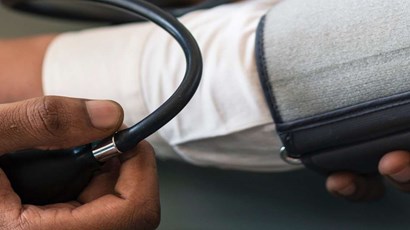High Blood Pressure Hypertension
High blood pressure (hypertension) happens when the force on the walls of blood vessels (caused by the blood within them) is more than normal. This means the heart has to work harder and the blood vessels are under more strain, making it a major risk factor for heart disease, stroke and other serious conditions.
What is high blood pressure?
Cheese could protect blood vessels from damage caused by high-salt diet
US researchers found cheese can help protect blood vessels against damage done by sodium, accord...
What is blood pressure?
Your blood pressure reading will have two figures, one 'over' the other - for example, 140/80. The higher figure (called the systolic level) is a measure of the pressure inside your arteries when your heart is pumping blood out. The lower figure (called the diastolic level) is a measure of the pressure inside your arteries when your heart is resting between heartbeats. Blood pressure is measured in millimetres of mercury (mm Hg).
A one-off blood pressure reading that is high does not mean that you have high blood pressure. Your blood pressure varies throughout the day. It may be high for a short time if you are anxious, stressed, or have just been exercising.
What are the symptoms of high blood pressure?
The vast majority of people with high blood pressure do not know they have it, until it causes a complication such as a stroke or heart attack. Usually high blood pressure is only picked up if blood pressure is checked routinely, or as part of checks for another medical problem.
Occasionally if blood pressure is very high, you can get headaches. Even more occasionally, some people feel a bit dizzy, or their vision can be affected by high blood pressure.
Other than the blood pressure reading being high, there isn't usually anything for the doctor to find on examination either. If blood pressure has been high for some time, or very high, there can be changes in the blood vessels at the back of the eye.
How is high blood pressure diagnosed?
You have high blood pressure if you have several blood pressure readings that are high, taken on different occasions, and when you are relaxed.
High blood pressure (hypertension) is a blood pressure that is 140/90 mm Hg or above each time it is taken at the GP surgery, or home or ambulatory readings where the average is more than 135/85 mm Hg. That is, it is sustained at this level.
Unless a single level is extremely high, your doctor will not make a diagnosis of high blood pressure without an average of several readings, usually from home or ambulatory measurements. Blood pressure recording outside of the doctor's surgery is recommended in most people who are suspected of having high blood pressure.
One reason for this is because some people become anxious in medical clinics. This can cause the blood pressure to rise. (This is often called white coat hypertension.) Home or ambulatory monitoring of blood pressure may show that the blood pressure is normal when you are relaxed.
However, if you have diabetes, or have recently had a heart attack or stroke, you may be advised to have blood pressure checks fairly often over the following week or so. Also, treatment with medication is usually considered at an earlier stage if the high blood pressure readings remain high.
High Blood Pressure Q&A
What is considered high blood pressure? How serious is high blood pressure? What can you do to lower your blood pressure? Can you test your blood pressure at home? All your questions answered.
Why is high blood pressure a problem?
High blood pressure (hypertension) is a risk factor for developing serious health problems sometime in the future. If you have high blood pressure, over the years it may do some damage to your blood vessels (arteries) and put a strain on your heart. In general, the higher your blood pressure, the greater the health risk.
Cardiovascular disease is the biggest risk from having high blood pressure. Cardiovascular diseases are diseases of the heart (cardiac muscle) or blood vessels (vasculature). This usually means diseases of the heart or blood vessels that are caused by atheroma. Patches of atheroma are like small fatty lumps that develop within the inside lining of blood vessels (arteries). Atheroma is also known as atherosclerosis and hardening of the arteries.
Cardiovascular diseases that can be caused by atheroma include:
What causes high blood pressure?
It isn't always clear what might be causing high blood pressure. Howevever, high blood pressure is more common in people:
- With diabetes. This is the case for type 1 diabetes but it is even more common in those with type 2 diabetes.
- Of African-Caribbean origin.
- From the Indian subcontinent.
- With a family history of high blood pressure.
- With certain lifestyle factors. That is, those who:
- Are overweight.
- Eat a lot of salt.
- Aren't physically active.
- Drink a lot of alcohol.
- Have a lot of stress.
How is blood pressure measured?
Your first blood pressure reading will usually be in a clinic or GP's surgery. If one reading is found to be high, it is usual for your doctor or nurse to advise a time of observation. This means several blood pressure checks at intervals over time. These will commonly be in the form of home or ambulatory readings. The length of the observation period varies depending on the initial reading and whether you have other health risk factors.
Clinic/GP surgery blood pressure readings
These are readings taken by a doctor or nurse in a clinic or a GP surgery, using a standard blood pressure machine.
Home blood pressure readings
You may be given (or asked to buy) a machine to take your own blood pressure readings at home.
These are readings taken by a person whilst seated and at rest at home, using a standard blood pressure machine. You need to take readings twice a day for a week. This will give 14 top and 14 bottom readings. Add the top readings together and divide by 14. Then do the same for the bottom readings. This gives you an average reading. It's normal for your blood pressure to fluctuate, so a single raised reading isn't a cause for concern unless it's extremely high.
You may be advised to take readings twice a day for eight days rather than a week, and ignore the readings from the first day, which will tend to be higher.
Ambulatory blood pressure readings
These are readings taken at regular intervals whilst you go about your normal activities. A small machine that is attached to your arm takes and records the readings, usually over a 24-hour period.
As a rule, an average of the ambulatory blood pressure readings gives the truest account of your usual blood pressure. Home blood pressure readings are a good substitute if an ambulatory machine is not available. Ambulatory and home readings are often a bit lower than clinic or GP surgery readings. Sometimes they are a lot lower. This is because people are often much more relaxed and less stressed at home than in a formal clinic or surgery situation.
See the separate leaflet called Home and Ambulatory Blood Pressure Recording.
What tests are done for high blood pressure?
If you are diagnosed as having high blood pressure (hypertension) then you are likely to be examined by your doctor and have some routine tests which include:
- A urine test to check if you have protein or blood in your urine.
- A blood test to check that your kidneys are working normally and to check your cholesterol level and sugar (glucose) level.
- A heart tracing, called an electrocardiogram (ECG).
The purpose of the examination and tests is to:
- Rule out (or diagnose) a secondary cause of high blood pressure, such as kidney disease.
- Check to see if the high blood pressure has affected the heart.
- Check for other risk factors such as a high cholesterol level or diabetes.
How to reduce high blood pressure
Sometimes there is quite a bit you can do with lifestyle changes, and in some people this may help them to avoid medication. In particular, the following help:
- Losing weight if you are overweight.
- Maintaining alcohol intake to within recommended limits.
- Reducing the salt you have in your food.
- Taking regular exercise.
Stopping smoking doesn't reduce your blood pressure as such, but smoking and high blood pressure put you at risk of the same conditions. So if you can quit smoking, you'll reduce your risk of strokes, heart attacks, etc.
See the separate leaflet called Living with High Blood Pressure.
Treatments for high blood pressure
As you can see in our leaflet on home and ambulatory blood pressure, doctors rarely treat high blood pressure on the basis of a single reading. Instead, guidelines suggest they should check your average blood pressure at home or using a machine you wear for 24 hours to measure your 'ambulatory blood pressure'.
It is recommended by the National Institute for Health and Care Excellence (NICE) that medication to help control high blood pressure should be used in addition to lifestyle advice for persistent stage 2 hypertension (clinic blood pressure measured as 160/100 mm Hg or higher but less than 180/120 mm Hg and home or anbulatory blood pressure average of 150/95 mm Hg or higher).
You might also be advised to start taking medication if you are aged under 80 with persistent stage 1 hypertension (clinic blood pressure between 140/90 mm Hg and 159/99 mm Hg and home or ambulatory blood pressure average of 135/85 mm Hg to 149/94 mm Hg) if it is found that the high blood pressure has caused any damage, such as to your eyes, heart or kidneys, or if you also have known cardiovascular disease, kidney disease, diabetes, or if it is found that you have a 10 year risk of a heart attack or stroke of above 10%.
Medication may be considered in addition to lifestyle advice if you are aged under 60 with stage 1 hypertension.
Medication may also be considered in addition to lifestyle advice if you are aged over 80 with stage 1 hypertension if your clinic blood pressure is over 150/90 mm Hg.
If you have 'grade 1 hypertension' clinic blood pressure 140/90 mm Hg to 159/99 mm Hg and subsequent ABPM daytime average or HBPM average blood pressure 135/85 mm Hg to 149/94 mm Hg - blood pressure of 140/90 mm Hg in clinic or average blood pressure of 135/85 mm Hg, doctors will check your 10-year risk of heart attack or stroke. This takes into account several factors including your age, gender, cholesterol levels and other medical conditions, as well as your blood pressure.
NICE recommends starting treatment if your 10-year risk is over 10%. That means many more people may be offered tablets to protect them against heart attack and stroke.
There are many different medicines for high blood pressure. They work in various different ways. Your doctor will advise on the best one for you. If it doesn't work, or you have side-effects, there are plenty of other options. The idea is to find you one or more pills which suit you, and which control your blood pressure. Once you and your doctor have cracked it, you'll need to keep taking your medication long-term to make sure you stay protected. Your blood pressure will be checked regularly and medication adjusted if need be.
See the separate leaflet called Medicine for High Blood Pressure.
Further reading and references
2021 European Guidelines on cardiovascular disease prevention in clinical practice; European Society of Cardiology (2021)
Guidelines for the management of arterial hypertension; ESH/ESC Clinical Practice Guidelines, European Society of Cardiology (2013)
Hypertension in adults: diagnosis and management; NICE (August 2019 - last updated March 2022)
Cardiovascular disease: risk assessment and reduction, including lipid modification; NICE Guidance (July 2014 - last updated February 2023)
He FJ, Li J, Macgregor GA; Effect of longer term modest salt reduction on blood pressure: Cochrane systematic review and meta-analysis of randomised trials. BMJ. 2013 Apr 3346:f1325. doi: 10.1136/bmj.f1325.
Description of the DASH (Dietary Approaches to Stop Hypertension) Eating Plan; National Institutes of Health
Ettehad D, Emdin CA, Kiran A, et al; Blood pressure lowering for prevention of cardiovascular disease and death: a systematic review and meta-analysis. Lancet. 2016 Mar 5387(10022):957-67. doi: 10.1016/S0140-6736(15)01225-8. Epub 2015 Dec 24.







